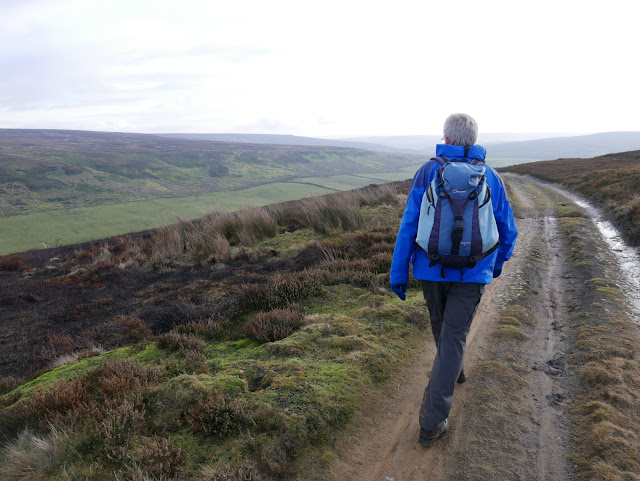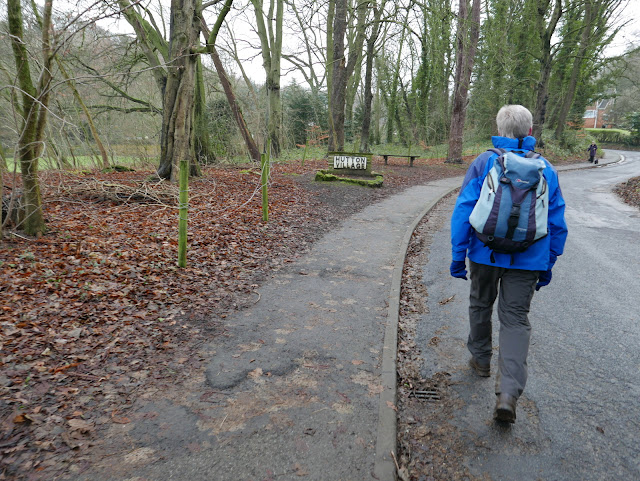We followed the road out of Silton and turned into a field at a gate. Although easy to miss, there is a way-mark on the telephone pole here, but most of today's route shows no indication of having being walked. Whilst shown on the map, tracks across the fields are non-existent.
 |
| Heading towards Greystone Farm |
 |
| Greystone Farm |
 |
| Suffolk rams at Greystone Farm |
 |
| No paths to be seen |
We continued along field paths until we reached Nether Silton where we crossed the road and and rejoined our path across fields, which led us to Hall Farm.
Two gates had been padlocked, although there were no stiles and one even had a way mark on the gatepost. There was no alternative but to climb over.
 |
| Nether Silton Green |
 |
| Hall Farm in the distance |
 |
| Icy conditions meant the going was less muddy than usual |
 |
| Way mark and padlock |
 |
| We'll have to climb over! |
We continued beyond the farm to walk through frozen fields until we reached the footbridge over Sorrow Beck.
After crossing the beck we walked through fields to reach a stone footbridge that is built over what used to be a 3.5 mile narrow gauge railway. Constructed in 1833 this railway brought limestone mined near Kepwick to kilns near to the Yarm and Thirsk turnpike road. We crossed another field and joined Peasland Lane which we followed for a mile into Cowesby.
 |
| Bridge over Sorrow Beck |
 |
| Sorrow Beck |
 |
| Continue along muddy trail towards Cowesby |
 |
| We see a deer ahead on the trail, see its white rump! It was off before I could get a better photo |
 |
| Clive approaches the old railway bridge |
A little further on we joined the road to Cowesby and saw a couple of quads parked at the road side. As we were speculating whether people might be shooting nearby there was a blast of shotguns. We came to the field where the shooters were standing, waiting for the beaters to put up some more birds. We stood and watched for a few minutes, marvelling that although some fell, so many birds escaped the barrage. An excited labrador ran backwards and forwards, picking up birds but not taking them back to the guns.
 |
| Beyond this field we join the road to Cowesby |
 |
| Who's left those here?! |
 |
| Shooters! |
 |
| Keep flying, you can do it! |
The first building we came to on entering Cowesby was St Michael and All Angels Church whose porch provided a shelter for us to enjoy our coffee and scones.
 |
| Walking along the road, Cowesby in the distance |
 |
| Cowesby and its church |
 |
| St Michael and all Angels Church |
The church was open and we went in for a look around. Its interior is suffering badly with damp patches on the walls.
 |
| Looking towards the altar |
 |
| Altar window |
 |
| 10 comandments carved in stone |
 |
| Lord's prayer on the other side of the altar |
 |
| Looking back down the church |
 |
| Christmas decorations in the font. |
 |
| Norman faces? |
Although the present church dates from only 1846 it replaced one of the oldest churches in the district, which stood on a Saxon site. We wondered if the many carved heads were modern or rescued from the old church.
The tower has an unusual pyramid roof which houses a ring of six bells, their ropes dangling near the altar.
We walked through Cowesby, past Home Farm, then followed a path bearing left along the western shoulder of Pen Hill. This path then led us down towards Kepwick.
 |
| Walking through Cowesby |
 |
| Owl weather vane in Cowesby |
 |
| Left before this gate, up to Pen Hill |
 |
| Looking west towards the A19 below |
 |
| Pen Hill |
 |
| Broken stile |
TSB mentions that a John Henry Warner constructed two reservoirs on the moors above Kepwick in 1873 to supply water to Kepwick Hall and we came to an old stone building with the remains of a large metal pipe in its floor. We guessed this must be something to do with Warner's reservoir system.
 |
| Part of the reservoir system |
We didn't enter Kepwick but instead crossed the road to re-enter fields which took us first to the disused railway and then to Bridge Beck which we crossed on a dilapidated bridge. A hundred yards later we reached and crossed Sorrow Beck where the bridge was little better.
 |
| Dilapidated bridges at Sorrow Beck |
 |
| The second bridge is no better! |
Back in pathless fields where way-marks are few and far between, but one should head for the old Manor Stone which is in the middle of a field next to the manor house, which dates from the 16th century. The stone is cryptically inscribed with letters whose meaning I've set out below the photograph. This inscription was the idea of a Squire Hicks to mark the spot where the medieval manor house once stood.
 |
| Walking through the gallops |
 |
| Looking back to Kepwick |
 |
| The Old Manor Stone (on left) |
 |
Here The Grand Old Manor House Stood
The Black Beams Were Oak, The Great Walls Were Good
The Walls At The East Wing Are Hidden Here
A Thatched Cottage Like A Barn Was Erected
Year AD 1765
A Wide Porch Spans A Yard And Alcove
|
|
 |
| The manor house |
Near to the manor house is the chapel of ease of All Saints which was rebuilt in 1812. Such a chapel is built for the convenience of parishioners who find it difficult to access the main church, in this case isolated St Mary's. We found it unlocked and went inside.
Tom Scott Burns explains that wood used in the altar rails and other refurbishments were presented by a R M Jaques, and were from HMS Dreadnought of Lord Nelson's day. We found this chapel to be in far better repair than the church at Cowesby.
 |
| All Saints, Nether Silton |
 |
| Looking towards the altar |
 |
| Modern window |
 |
| Altar window |
 |
| Looking back from the altar |
 |
| The view from the Gods |
We were interested to see a memorial to the fallen from WWI listing seven men from this tiny hamlet, and in the graveyard saw a memorial to one of them, a soldier who fell at the Battle of Marne.
After wandering round the graveyard and reading some of the cheering Victorian epitaphs we left the church and immediately turned off the road at a white gate opposite, just near to the post box.
There is no sign to indicate this public path, which leads through to fields. Once in the fields we were now returning and parallel to Greystone Farm and its Suffolk sheep.
After crossing the tarmac of Kirk Ings Lane we reached St Mary's Church, which appears abandoned in the middle of a field, positioned some distance from the village of Over Silton.
 |
| St Mary's Church, Over Silton |
We felt we had visited enough churches today so walked on by but if you wish to see more about this church then please click on our last visit there.
A short walk took us to the houses of Over Silton and our car.








































































































